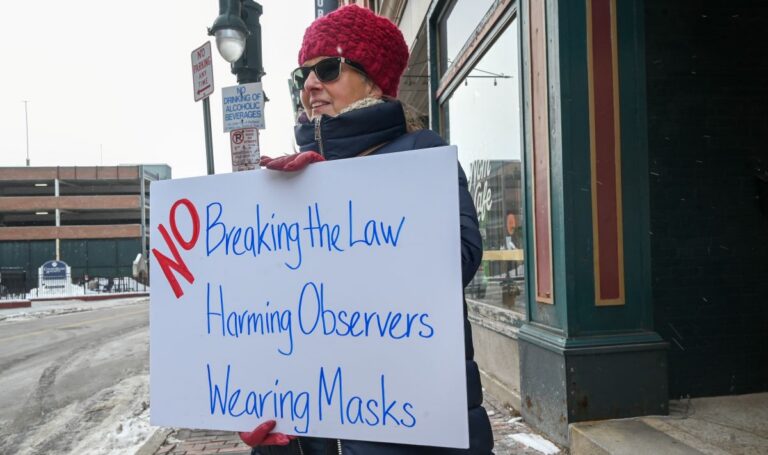Maine’s eight elected district attorneys wield tremendous power to decide how or whether to charge someone with a crime, whether to strike a plea deal and whether there’s enough evidence to win the case at trial.
That power became painfully clear to Alison McKellar of Camden over the last two years after the death of her 32-year-old sister in a boating accident on Damariscotta Lake. Kristen McKellar and a friend were swimming late in the evening on Aug. 2, 2018, when she was struck and killed by a boat operated by Jonathan Roberts, 46, of Waban, Mass.
Republican District Attorney Jonathan Liberman assured McKellar and her parents that he felt strongly that there was ample evidence to take the case to trial, McKellar said. He pursued, and received, a manslaughter indictment from a grand jury.
But Liberman then lost the November 2018 election to Democrat Natasha Irving, who now serves Waldo, Knox, Lincoln and Sagadahoc counties. After she and her staff reviewed the evidence, they determined the case was not strong enough to take to trial.
What started as a manslaughter charge with the potential for up to 30 years in prison ended with Roberts pleading guilty to one boating charge, being required to do 100 hours of community service and paying a $400 fine, court documents show. He did not serve any time in jail.
The whiplash of going from one opinion of the case to another has left Alison McKellar feeling she and her family never got their day in court.
“I felt like no matter what the outcome, I wanted to hear the state present the strongest possible argument for swimmers’ rights over boaters’ rights,” McKellar said recently during a conversation at her kitchen table. “I thought there was value in that even if we didn’t get a guilty verdict.”
Over the last 30 years, the power of Maine’s district attorneys has grown, fueled by their ability to make plea deals and because mandatory minimum sentences have taken discretion away from judges. District attorneys’ philosophies of how to mete out punishment can vary widely, meaning outcomes for defendants and families can be very different in different parts of Maine.
RELATED Due Process: Talking justice with Maine’s district attorneys
The current crop of district attorneys – all of whom were elected to four-year terms in November 2018 includes five Democrats, two Republicans and one independent. Some choose to use alternative sentencing programs more frequently than others, some focus additional attention on domestic violence.
Across the country, 47 states elect local prosecutors who handle about 95 percent of all criminal prosecutions, according to the Moritz College of Law at The Ohio State University.
‘It’s not good’
The Maine Warden Service incident report into the accident that killed Kristen McKellar describes a typical hot summer night on a Maine lake – people swimming and boating, spending time with friends and family – that ended in tragedy.
Roberts told wardens that he was taking members of his family for an “after-dinner pleasure cruise” on his 17-foot stern drive boat. He was driving the boat and his older brother, who has special needs, was along for the ride, as were three children.

Roberts told wardens that he had made the trip along the eastern shore “between 50 and 70” times, but had only traveled the route in the dark about a dozen times. He had his bow and stern lights on and said it “was getting dark and was hard to see” at the time of the accident, which he said occurred between 8:30 and 8:45 p.m.
He estimated that his boat was 50 to 100 yards from shore.
The friend who was swimming with McKellar told wardens that the two of them had spent the day at his camp in Jefferson on the lake. They went swimming in the afternoon, then went to Hannaford to get pizza, chicken and watermelon. They got back in the water for a bit to float around on some inflatables and both fell asleep on them, according to a written statement provided to wardens by the man, whose name is redacted from the report.
Shortly after 8 p.m., McKellar suggested going for one last swim before she headed home to Belfast and he went home to Portland. The man said he ran up to the house to put on a wetsuit because he is always cold. When they got in the water, McKellar lost one of her flippers close to the dock, so they went back to get a mask and snorkel to find it, he wrote. He estimated it was about 8:30 p.m. by then.
“So we went back to the dock and got the mask and snorkels and then after a brief, very half-hearted search, we gave up and decided that life is too short to waste it looking for a $15 flipper and we’d find it tomorrow or another day if we could,” he wrote.
He recalls that he and McKellar were about 35 yards out in the lake when they heard a boat coming. They both started waving their hands and yelling at the boater to get his attention. He said he believes the boat was operating “at full throttle.”
“I was astonished because usually people don’t boat at top speed so close to shore, let alone at dusk, and regardless usually boaters go in the middle of the lake unless they’re puttering into shore to go to their dock to tie up,” he wrote.
Roberts told wardens he saw a “black dot in the distance” so he turned the boat toward shore to avoid it. He said the man was swimming 15 to 20 feet farther out into the lake than McKellar.
“I asked how he knew he ran the girl over,” the warden report states. “He said, ‘I saw a glint of golden hair’” and then he “felt her hit the boat.’”
The man swimming with McKellar said he called to see if she was OK, assuming that she probably had been “swamped by the wake of the boat.”
She said, “no I am not okay, it’s not good,” he wrote.
McKellar’s friend said he started shouting as loudly as he could to call 911, hoping one of his neighbors on shore would hear him.
Roberts said he immediately swung his boat around, jostling the kids in the back. When he got back to the man in the water, he found him holding McKellar, turned off the motor and tried to lift her out of the water over the bow of the boat.
When that didn’t work, he put the ladder down off the back of the boat and was able to lift her in. He took off his shirt and tied it around her leg, noticing that both legs were injured and that she had a “huge laceration” on her abdomen or hip. He tried to start the boat to bring it in to shore, but it wouldn’t start.
McKellar’s friend then said he would swim the boat in and a neighbor with a kayak arrived to help pull the boat to shore. While that was happening, Roberts was in the boat performing CPR on McKellar. The first responders had already arrived and were waiting on shore. They had called for LifeFlight, but canceled it once they realized McKellar had died.
The next day, the Office of the Chief Medical Examiner listed McKellar’s cause of death as exsanguination – a severe loss of blood.

‘Absolute tragedy’
To try to determine how far out McKellar was in the lake when she was hit, wardens conducted a dive mission on Aug. 31 to find both of her flippers, writing in the report that it would “give an accurate depiction of where Kristen McKellar was struck by the boat.” They found the first flipper – the one she lost when she got into the water – at the bottom of the lake about 66 feet from shore. The other one, which her friend said she removed and was waving in the air when she was struck was 420 feet from shore.
Alison McKellar said other witness accounts placed her sister within 200 feet of shore, which is known as the water safety zone. State law requires boaters in that area to go no faster than headway speed, the minimum speed needed to steer a boat.

As part of the investigation, wardens also took Roberts’ boat out on the lake on Aug. 20 at 8:17 p.m., nearly 43 minutes after sunset and the same amount of daylight that would have been present at the time of the accident. The wardens traveled headway speed and indicated in the report they did not feel it was safe to go any faster “due to the lack of visibility.”
They also conducted other tests to determine Roberts’ speed at the time of the accident and concluded it was likely he was going 17 to 18 mph. The speedometer on Roberts’ boat did not work, but he told them he estimated he was going between 3000 and 3200 rpm at the time of the accident.
To determine the speed, the wardens ran Roberts’ boat at 3000 rpm, used two different GPS units on board and had another warden follow beside them in his boat with a separate GPS, according to the warden report.
Liberman, the district attorney at the time, met with McKellar and her mother and father to discuss the case, McKellar said. McKellar described Liberman as knowledgeable and felt confident in what he presented, knowing he intended to seek a manslaughter indictment from a grand jury. One point of contention would be how far Kristen McKellar was from shore when she was struck, with the family believing she was within 200 feet and the warden service putting her much farther out at 420 feet.
Liberman quickly assuaged her concerns.
“He said for us it doesn’t matter where she was in the lake,” McKellar said. “There’s no law against swimming across a lake. The responsibility is on the boater to be able to see and he was going too fast for those conditions.”
Liberman, now an assistant DA in Cumberland County following his election loss, declined to comment for this story.
When a grand jury returned a manslaughter indictment in January 2019, McKellar said she felt relieved knowing the family could focus on grieving and not have to worry about the court proceedings, she said.
For his part, Roberts was “shocked” to learn he had been indicted on a charge of manslaughter, said Augusta attorney Walter McKee, who represented him. Through McKee, Roberts declined to be interviewed for this story and asked his attorney to speak on his behalf.
“The original DA believed a manslaughter case was appropriate, so be it, and the new DA took a better look at that, in my humble opinion, and determined that something else needed to be done,” McKee said.
Irving, 36, ran on a platform that emphasized bringing fewer cases against non-violent offenders, instead focusing resources on major cases, particularly domestic violence. She wanted to use more restorative justice techniques designed to rehabilitate the offender and give a sense of healing and closure to victims.
McKellar, a Camden select board member, said she voted for Irving, believing it was time to reform the criminal justice system. But she can’t understand how Irving and the other prosecutors in her office didn’t think they could bring charges against the man who killed her sister, especially after Liberman made a compelling case during discussions with the family, she said.
“The whole thing just felt very hollow,” she said.
Irving described the accident as “an absolute tragedy.”
“The reconstruction made it clear that this was a terrible accident,” she said.
Irving said even though the original indictment was on a charge of manslaughter, prosecutors in her office and the Warden Service concluded they did not have the evidence to convince a jury to convict.
“That doesn’t mean there isn’t someone to blame,” she said. “It doesn’t mean Mr. Roberts did everything correctly. We don’t believe that at all. But the conclusion of our staff was he hadn’t committed a manslaughter. That was a very hard conclusion to come to.”
McKellar said the DA’s office worked with her family to try to find something that would give them a sense of justice, indicating that they could try to prohibit Roberts from ever boating again or maybe have him spend a day or two in jail.
“He has kids and we didn’t want to make the world a worse place again because of this,” McKellar said. “That wouldn’t necessarily make me feel better.”
After more back and forth, McKellar said her family was shocked that the agreement, called a deferred disposition, required Roberts to plead guilty to reckless operation of a watercraft and do 100 hours of community service. If he is not arrested again and completes his community service, the charge will be dismissed and he will be fined $400 for operating a boat at greater than headway speed within a water safety zone.
“It was like nothing,” McKellar said. “All of us were like, oh my gosh, never did I think it would be this. It went from indicted on manslaughter and all these things to just 100 hours of community service? It was a huge slap in the face. Why even put anything in there? One hundred hours of community service? That’s what Kristen would have done in a month just because she wanted to.”
Irving said she knows the family is upset, but she did not think prosecutors could prove manslaughter, based on the evidence. And she insists the decision was not part of a larger effort to change the criminal justice system.
“That was one of those cases where I think that the public understanding was that because I had run on a platform of criminal justice reform, that this was me trying to use this as a guinea pig for restorative justice,” she said. “This was purely a prosecutorial decision based on the facts. That was hard to do. I don’t think anybody was excited about that outcome.
“What we ultimately want is for the public to be safe and for victims to feel whole, and we knew in this case we were in a position where we were letting down the survivors terribly because they wanted a conviction.”
Power of the DA
The difference in how two DAs viewed the case illustrates the power Maine’s eight elected district attorneys have in the criminal justice system.
That power has grown over the last 30 years because of mandatory minimum sentences and because “so many cases are resolved by a plea,” said Kennebec/Somerset District Attorney Maeghan Maloney.

“If we had the capacity to have more trials and if we didn’t have mandatory minimums, you would put the power back in the court,” she said. “I completely oppose mandatory minimums. I personally oppose it because I think the power should be with the court.”
As an example, Maloney said someone convicted of driving while their license is revoked could be sent to prison for nine months and one day if they had multiple prior convictions, because of the mandatory minimum sentences outlined in state law. But as a prosecutor, she has the power to decide how to charge the offender, essentially deciding whether to strictly follow the law as written or charge the accused person in a way that doesn’t trigger the mandatory minimum.
“There are some prosecutors who believe because the Legislature is responsible for writing the law, that they should charge it exactly as the facts compel them to charge it,” she said. “But the reason I disagree with that is because we have a situation where the only person who can change the sentence is me. I would charge it the way the facts require it to be charged, if we could then go into court and the judge could impose a fair and rational sentence for this individual. I really believe you have to have individual sentencing. You can’t treat people like interchangeable machine parts.”
“Because the judge can no longer do that, the prosecutor, I believe, has to do that,” she said.
In the example of someone charged with driving with a revoked license, Maloney could strike a prior conviction, so the person ends up with six months in the county jail rather than nine months in the state prison.
Irving said the district attorneys often disagree about the use of jail time and that accounts for the differences between a sentence someone might get in one part of the state versus another.
“We have disagreements about jail sentences and the utility of them,” she said. “I do think there’s going to be a difference. I won’t agree to an arbitrary jail sentence. It really does make a big difference who your district attorney is.”
For Alison McKellar, it wasn’t until the accident that killed her sister that she had occasion to think about the power of a local district attorney.
“It’s one of those things that’s like ‘oh hold on, what district attorney, that’s an elected position?,” she said. “There’s Democrats and Republicans? It was kind of mind boggling a little bit. OK, are we sure this is the right way to set up the system?”

Final hearing
Though Alison McKellar, her mother, Molly, and father, Hugh, weren’t happy with the outcome of the case, they went to the Lincoln County Courthouse in Wiscasset on July 29, 2019 to speak at Roberts’ last hearing.
Justice Daniel Billings presided over the hearing in which the attorneys outlined the terms of the agreement. Roberts pleaded guilty to reckless operation of a watercraft, while the state dismissed charges of manslaughter and operating a watercraft at an imprudent speed, said Assistant District Attorney Matthew Gerety, according to a transcript of the proceedings. The agreement requires Roberts to complete 100 hours of community service and provide proof of those hours to the DA’s office.
If he completes them within one year and does not violate any other laws, the state will dismiss the reckless operation of a watercraft charge and Roberts will admit to operating greater than headway speed in a water safety zone and be fined $400. If he violates the agreement, he faces a charge of reckless operation of a watercraft, which carries up to 364 days in jail and a fine between $200 and $2,000.
When it was time for the family to speak, Molly McKellar talked about how much her daughter helped everyone, whether it was mowing lawns or removing snow for her family or helping veterans or others with home repairs and website maintenance. She said Kristen loved the lakes, especially paddle-boarding with her dog Diego.
She then addressed Roberts directly.
“Step up, make people smile, foster or find fosters for animals, fix the neighbor’s plumbing for free, speak up for the less able and go forward,” she said. “You cannot fix the past, but you have the gift of freedom. Use it well.”
“It’s beyond reckless behavior. It’s deadly criminal behavior and you get – after running over Kristen and stabbing us in the gut, you get a slap on the wrist. That’s just – this isn’t justice.”
— Hugh McKellar
Alison McKellar addressed the court next, describing her sister as her best friend, someone she would call for advice, whether it was how to get water out of her iPhone “or to help me rescue a baby squirrel or to watch my kids.”
She expressed her continued dismay that the DA’s office did not pursue more serious charges against Roberts. And she talked about the heartache she faced when telling her children their aunt was gone.
“Like phone numbers from childhood or a familiar drive, there are things that become burned into your psyche and I don’t know if I will ever stop thinking she is here,” she said. “Ever stop having to remind myself, 1,000 times a day, that there’s no calling Kristen.”
Kristen’s father, Hugh McKellar, spoke next.
“I’m Kristen’s dad,” he said. “And I finally get to look at the man who killed my daughter eye to eye.”
He described his daughter as well-read, curious, open-minded and “a lifelong learner.” He then talked about his frustration with the criminal justice system, feeling the case should have been presented to a jury.
“It’s beyond reckless behavior,” he said. “It’s deadly criminal behavior and you get – after running over Kristen and stabbing us in the gut, you get a slap on the wrist. That’s just – this isn’t justice.”
After a few remarks from McKee – who noted that Roberts has no criminal record and that alcohol was not a factor in the crash — Roberts got his chance to speak.
“I think about that night all the time,” he said. “I replay that horrible night, hundreds of times over in my head, and every time I do, I wish there was a different outcome. But the outcome from that night was that an amazing woman died, and her death created such tremendous grief and immeasurable loss with her family, with her friends, and in her community.”
Before announcing his decision on the plea agreement, Judge Billings explained his views on justice, saying he wonders whether even sending a murderer to prison truly achieves it.
“Does that really make up for or provide appropriate accountability for evil acts?” he said.
In general, justice is always the goal, he said, but sometimes the best a judge can do is “apply the law reasonably and fairly.”
“Not every accident is a result of recklessness or negligence or even criminal negligence,” he said. “Some horrible circumstances are just that, they’re accidents. Even when someone makes a mistake, and is the cause of an accident, not every mistake constitutes a crime.”
He noted that he believed there were a number of ways to look at the facts and it would have been a difficult case for the state to take to trial. He then announced his approval of the agreement and 44 minutes after the court proceeding started, it was over.
Months later, sitting in her Camden home, Alison McKellar said she’s still struggling with how Irving handled her sister’s case. She’s still trying to wrap her head around what happened and wishes the DA’s office had worked to at least draw attention to the case to help prevent future tragedies.
“There’s a great place for criminal justice reform and all this stuff, but completely abandoning the idea that we sometimes need to set an example for society, it sometimes matters what the headline is,” she said. “You hit a swimmer. Are you going to be held accountable for it? Everybody knows it’s pretty bad to hit a pedestrian even if they aren’t in a crosswalk.”
McKellar remembered her younger sister as someone who rescued pit bulls, spent time in New York City as a web designer, then returned home and took up carpentry. She was close to finishing renovations on a fixer-upper when she died.
“The only consolation in all of this is there’s so many people when they die, it’s so sad because they haven’t quite started living yet,” she said. “They are waiting for something. That’s not the case with Kristen at all. She was definitely living a fulfilled life. A very happy person.”







